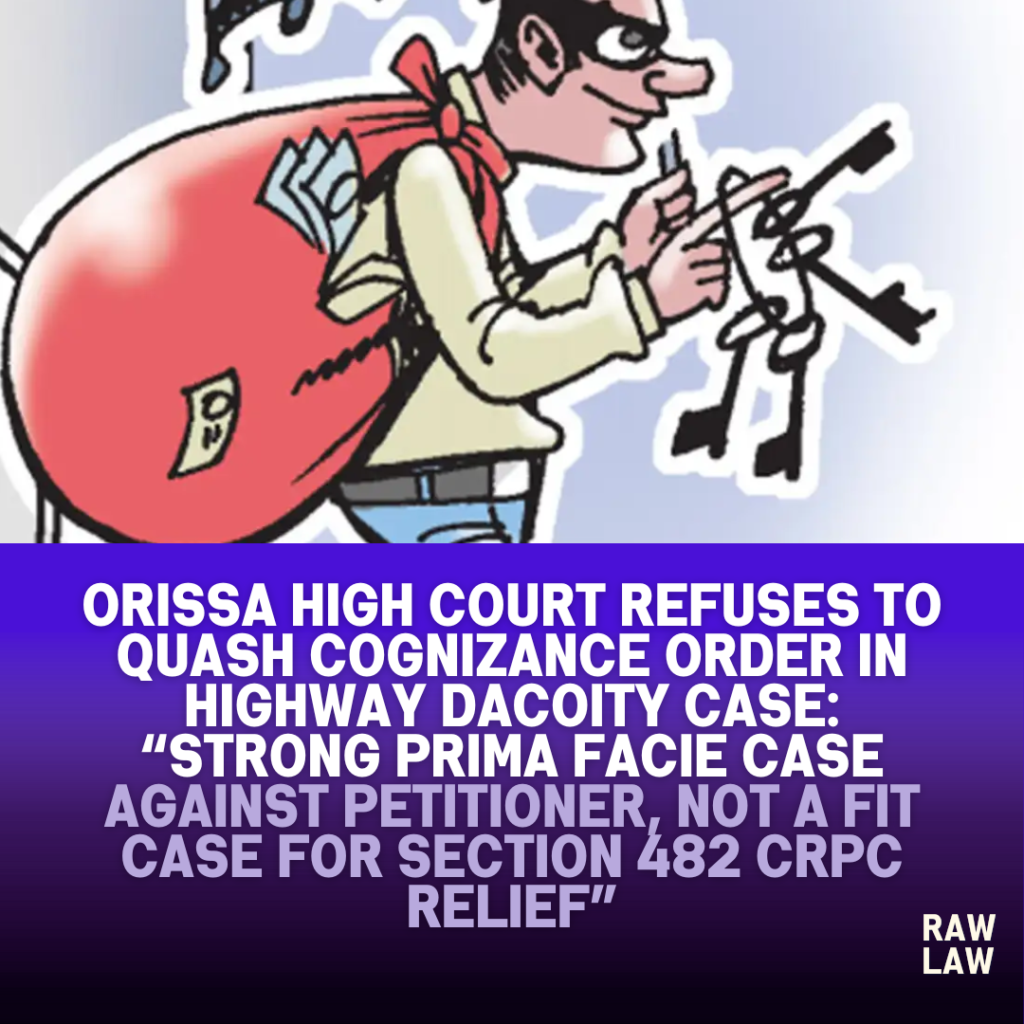Court’s Decision
The Orissa High Court dismissed a petition seeking quashing of a cognizance order passed by the Magistrate in a highway dacoity case. The Court held that the petitioner was “found actively to have participated in the alleged dacoity,” and that a “strong prima facie case is well made out” against him. It concluded that the petition did not merit interference under Section 482 of the Criminal Procedure Code. However, the petitioner was given liberty to raise all factual and legal pleas at the stage of framing of charge.
Facts
The case arose out of an incident reported on 27.11.2011 where a group of seven unidentified individuals allegedly committed dacoity at gunpoint in respect of a truck loaded with iron rods near Kukurpota Bridge on National Highway 215. The case was registered under Ghatgaon P.S. Case No. 148 of 2011. Following investigation, a charge sheet and a supplementary charge sheet were submitted against multiple accused, including the petitioner. The SDJM, Keonjhar took cognizance against the petitioner for offences under Sections 395, 412, 109 of the Indian Penal Code and Section 25 of the Arms Act.
Issues
- Whether the order of cognizance dated 03.08.2015 taken by the SDJM, Keonjhar against the petitioner is liable to be quashed under Section 482 CrPC.
Petitioner’s Arguments
The petitioner argued that he was an innocent person falsely implicated in the case. It was contended that there was no material against him in the FIR or the witness statements. The main submission was that his alleged involvement was based solely on the statement of a co-accused, which was insufficient to establish a prima facie case or sustain the order of cognizance. Therefore, the continuation of proceedings would amount to an abuse of process.
Respondent’s Arguments
The State strongly opposed the petition, contending that the charge sheet, supplementary charge sheet, and witness statements clearly established the petitioner’s role in the alleged dacoity. It was argued that the petitioner was one of the ten individuals who participated in the highway dacoity and that stolen materials had been seized. The prosecution emphasized that the case records directly connected the petitioner to the crime.
Analysis of the Law
The Court analysed the law relating to the exercise of inherent powers under Section 482 CrPC, referring to established principles governing the quashing of criminal proceedings. It observed that these powers are to be exercised sparingly and only in cases where the allegations are patently absurd or manifestly false, or where there is no foundation in law to proceed against the accused.
Precedent Analysis
The Court relied on the landmark judgment of the Supreme Court in State of Haryana v. Bhajan Lal, 1992 Supp (1) SCC 335, which laid down illustrative categories where quashing of criminal proceedings would be justified under Section 482 CrPC. The High Court reiterated that if allegations disclose a prima facie offence, even if disputed by the accused, they must be tested during trial and not at the pre-trial stage.
Court’s Reasoning
The Court held that the name of the petitioner was clearly mentioned in the case record and that he was stated to be one of the participants in the dacoity. It observed:
“The case record reveals several facts that directly connect the Petitioner to the core of the alleged offence. He is stated to be one of the ten individuals who actively participated in the dacoity on the highway.”
It was further held that the petitioner’s defence required appreciation of evidence and was not fit to be examined in a petition under Section 482 CrPC. The Court rejected the argument that the petitioner’s implication was solely based on co-accused statements.
Conclusion
The Court concluded that a prima facie case was made out against the petitioner, and there was no ground to quash the order of cognizance. However, it granted liberty to the petitioner to raise legal and factual defences at the stage of framing of charge.
“This Court is not inclined to interfere with the impugned order which is just and proper. However, it is open to the Petitioner to raise all possible permissible legal and factual plea at the appropriate stage.”
The petition was accordingly dismissed.
Implications
This judgment reinforces that quashing of criminal proceedings under Section 482 CrPC is an exceptional remedy and cannot be invoked merely because the accused disputes the allegations. If the material in the charge sheet prima facie discloses an offence, the trial must proceed. The ruling also emphasizes the limits of judicial review at the pre-trial stage and preserves the right of the accused to defend themselves during trial.
Cases Referred
- State of Haryana v. Bhajan Lal, 1992 Supp (1) SCC 335: The Court relied on the guidelines laid down in this case to determine whether a case merits quashing under Section 482 CrPC. It reiterated that a strong prima facie case based on police records and charge sheet materials would preclude interference at the initial stage of proceedings.
FAQs
1. Can a cognizance order be quashed merely on the basis of co-accused’s statement?
No. The Orissa High Court held that when the case record and charge sheet contain independent material implicating the accused, the court will not quash the proceedings under Section 482 CrPC.
2. What is the significance of the Bhajan Lal case in deciding quashing petitions?
The Bhajan Lal judgment lays down the principles under which criminal proceedings may be quashed. It is the guiding precedent for courts exercising powers under Section 482 CrPC.
3. Can an accused raise defences after the quashing petition is dismissed?
Yes. The Orissa High Court allowed the petitioner to raise all legal and factual pleas during the trial stage, including at the time of framing of charges.



